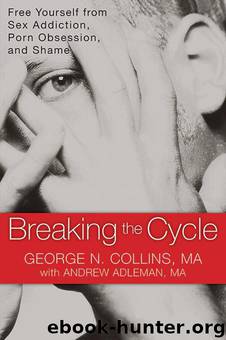Breaking the Cycle: Free Yourself From Sex Addiction, Porn Obsession, and Shame by George Collins & Andrew Adleman

Author:George Collins & Andrew Adleman
Language: eng
Format: mobi
Tags: Substance Abuse & Addictions, General, Self-Help
ISBN: 9781608820856
Publisher: New Harbinger Publications
Published: 2011-10-01T21:15:47+00:00
Coping Behaviors to Feel Better
The story you have could be connected with what made you feel better as a child when you were alone in your room and heard your parents arguing, or when your older brother was mean to you, or when your father gave you a beating. As a result of early life experiences, you may have developed a story that had to do with betrayal or abandonment or abuse.
My story was about my mother’s sexually inappropriate behavior with me. I developed a story around sexuality before I was old enough to really understand sex or intimacy. As a result, for many years as an adult, I sought sex that was impersonal. Only when I had revealed my story was I able to embrace true sexuality and intimacy. Revealing the part of my story where I mistakenly blamed myself helped me free myself from my sexually compulsive behavior.
There are many examples of a person developing a story around sexuality before he was older and more emotionally stable than he was as a child. Your thoughts about sex could have started when your older sister insisted that she show you her breasts when you were six years old. A neighbor boy might have asked if you wanted to masturbate together. An uncle might have touched you inappropriately. What impact could these or similar occurrences have on a young child? As adults, we know what is inappropriate. But what does a child know about experiences like these?
In psychology, there is a theory about childhood development called object relations. Research in this area has shown that children do not blame those on whom they are dependent for food, shelter, and love. Instead, they blame themselves. Object relations theory was pioneered in the 1940s and ’50s by British >psychologists Ronald Fairbairn, D. W. Winnicott, and Harry Guntrip (Hamilton 2006). As a result of their studies with abused children, the British psychologists concluded that, prior to puberty, children do not yet have the maturity to understand what is happening to them. Specifically, they are not yet mature enough to place blame where it may belong, such as on the person they are depending on for food, shelter, and love. Instead, the child creates a story about it being his or her fault (Fairbairn et al. 2006).
Download
This site does not store any files on its server. We only index and link to content provided by other sites. Please contact the content providers to delete copyright contents if any and email us, we'll remove relevant links or contents immediately.
The Compound Effect by Darren Hardy(8904)
Wonder by R.J. Palacio(8553)
Atomic Habits: Tiny Changes, Remarkable Results by James Clear(8305)
Becoming Supernatural by Dr. Joe Dispenza(8186)
Wonder by R. J. Palacio(8085)
Change Your Questions, Change Your Life by Marilee Adams(7718)
The Road Less Traveled by M. Scott Peck(7574)
Born to Run: by Christopher McDougall(7105)
Daring Greatly by Brene Brown(6487)
Big Magic: Creative Living Beyond Fear by Elizabeth Gilbert(5726)
Grit by Angela Duckworth(5576)
The Slight Edge by Jeff Olson(5397)
Men In Love by Nancy Friday(5218)
The Wisdom of Sundays by Oprah Winfrey(5135)
You Are a Badass at Making Money by Jen Sincero(4905)
Fear by Osho(4720)
The Miracle Morning by Hal Elrod(4692)
The Four Tendencies by Gretchen Rubin(4586)
Rising Strong by Brene Brown(4431)
